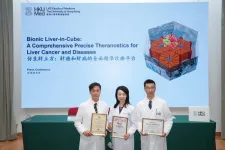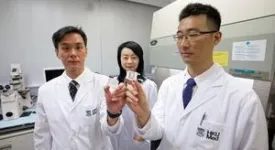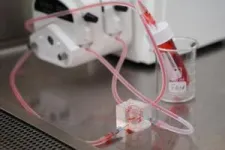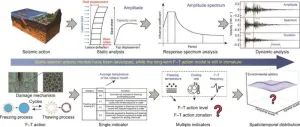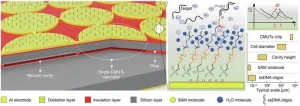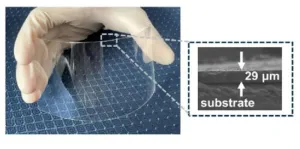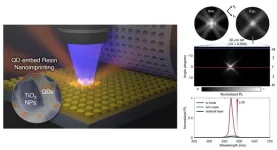(Press-News.org) Background
Liver cancer is the sixth most common cancer and third leading cause of cancer death globally. According to Hong Kong Cancer Registry data, there are approximately 1,800 new cases of liver cancer each year, with over 1,500 deaths, over 80% of which are advanced cases at first diagnosis. Patients with advanced liver cancer who are not suitable for surgical operations have limited treatment options. Traditional chemotherapy, targeted therapy and immunotherapy for treating advanced liver cancer often have a low response rate and severe side effects, thereby limiting their efficacy and hindering the patient’s quality of life.
Patients with different tumours and immune microenvironments respond differently in terms of drug efficacy, side effects and drug resistance, resulting in unpredictable treatment outcomes among patients, even with the same drug. Owing to the lack of precise drug-screening strategies, liver cancer patients often undergo multiple treatment failures in the search for the most suitable drug. This results in unnecessary financial burden on patients and failure to catch the golden time in killing the tumour cells effectively and the chance to prolong survival and improve the quality of life.
Research findings and significance
To develop precision medicine for liver cancer, the research team invented three core technologies. First, it uses novel technology in cells and matrix protein separation by simultaneously extracting hepatocytes, tumour cells, immune cells and matrix proteins from the tissue of the liver cancer patient. The invention also accurately simulates the tumour characteristics of individual patients, such as the number of cells, tissue stiffness, immune status and other key factors, to tailor-make and customise a high-standard, biomimetic and personalised drug-screening platform. Second, utilising advanced 3D bioprinting technology, a novel model with regions containing normal tissue, tumour tissue and vascular structure is fabricated. Compared to traditional 3D cell culture and organoid products, the invention is more biomimetic and capable of reproducing the patient’s tumour architecture and characteristics. Third, the innovative tumour model is equipped with a unique microvascular system, allowing the product to continuously undergo drug tests and to evaluate the effects of various therapies on the bench.
Professor Man Kwan, Chair Professor in the Department of Surgery, School of Clinical Medicine, HKUMed, who led the research project, pointed out that there is currently a lack of personalised drug-screening products and services related to malignancies, especially liver cancer, in the market. The new drug screening platform ‘Liver-in-Cube’ accelerates the evaluation of the efficacy and side effects of various drugs for patients, allowing doctors to identify the optimal treatment method for personalised treatment. The invention allows patients to quickly receive the most effective and individualised treatment with the least adverse effects and reduced recurrence, thus leading to prolonged survival and improved quality of life.
Professor Man believes that the invention has broad application prospects and can be extended to other cancers and liver diseases. ‘For clinical applications in personalised drug screening, the invention provides speedy and precise treatment options in the best interests of patients. It can significantly improve the quality of life of patients by promoting early diagnosis and treatment of liver cancer and liver disease, and accelerating the promotion and application of precision medicine for various diseases,’ stated Professor Man.
‘Liver-in-Cube’ accurately simulates diseases in patients and can also be widely used in new drug development as a substitute for animal models. It provides preclinical efficacy and safety testing for new drugs with more accurate data, thus increasing the success rate of further clinical trials. The product can shorten the new drug development cycle and reduce costs. In terms of basic research, the invention can replicate the liver cancer and liver disease microenvironment in multiple dimensions, which can help researchers deeply explore the regulatory mechanisms of the disease’s immune microenvironment, and help accelerate the discovery of new targets and the development of new treatments.
At present, ‘Liver-in-Cube’ is undergoing preclinical study, clinical efficacy research and safety assessment. The research team aims to leverage the scientific data to facilitate the commercialisation of the technology and make it available in both local and overseas markets, thus benefitting a wide range of patients. The invention has the potential to promote industry upgrading in the fields of medical health, pharmaceuticals and basic research, strengthening Hong Kong’s position as an international innovation hub for life and health technologies.
About the research team
The award-winning research was jointly led by Professor Man Kwan, Chair Professor, Department of Surgery, School of Clinical Medicine, HKUMed; and Professor Lu Jian, City University of Hong Kong. The research team members included Professor Albert Chan Chi-yan, Clinical Professor; Dr Liu Jiang, Research Assistant Professor, and Dr Oscar Yeung Wai-ho, Postdoctoral Fellow, in the Department of Surgery, School of Clinical Medicine, HKUMed.
Media enquiries
Please contact LKS Faculty of Medicine of The University of Hong Kong by email (medmedia@hku.hk).
END
HKUMed’s world-first ‘Liver-in-Cube’ wins a gold medal at International Exhibition of Inventions of Geneva, advancing precise cancer treatment
2024-06-12
ELSE PRESS RELEASES FROM THIS DATE:
Nationwide zonation and durability assessment of China’s plateau infrastructure under freeze–thaw cycles
2024-06-12
In a bid to tackle the enduring problem of infrastructure durability in the face of relentless freeze–thaw (F–T) cycles, a team of researchers has published a new study in Engineering. The study focuses on the Chinese Plateau region, where the harsh effects of F–T cycles on concrete structures have led to concerns regarding their aging and subsequent performance deterioration.
The authors of the study emphasize that the existing national standards for designing frost-resistant concrete structures are insufficient, as they rely primarily on the coldest monthly average temperature without accounting for the intricate spatiotemporal variations, amplitude, and ...
Innovative CMUT-based resonant biosensor offers enhanced DNA detection specificity
2024-06-12
In the latest study, researchers have successfully demonstrated a novel biosensor capable of detecting single-stranded DNA oligonucleotides with high specificity without needing external labels. This advancement paves the way for more accessible and efficient point-of-care diagnostics, as reported in a recent study published in Engineering.
The biosensor in question is based on capacitive micromachined ultrasonic transducers (CMUTs), which have shown promise for developing miniaturized, high-performance biosensing platforms. However, previous ...
Transparent organic–inorganic hybrid photoresist with highly tunable refractive index for advanced display
2024-06-12
Researchers at Beijing University of Chemical Technology (BUCT) and BOE Technology Group Co., Ltd. (BOE) have developed a novel type of transparent organic–inorganic hybrid photoresist with highly tunable refractive index. The study published in Engineering presents the synthesis of transparent photoresist made of titanium dioxide nanoparticle-embedded acrylic resin with a tunable refractive index of up to 2.0 (589 nm) after being cured by ultraviolet (UV) light, while maintaining both a high transparency of over 98% in the visible ...
Quantum dots and metasurfaces: Deep connections in the nano world
2024-06-12
In relationships, sharing closer spaces naturally deepens the connection as bonds form and strengthen through increasing shared memories. This principle applies not only to human interactions but also to engineering. Recently, an intriguing study was published demonstrating the use of quantum dots to create metasurfaces, enabling two objects to exist in the same space.
Professor Junsuk Rho from the Department of Mechanical Engineering, the Department of Chemical Engineering, and the Department of Electrical Engineering, ...
Researchers at Houston Methodist find survival improves with open radical hysterectomy in early-stage cancer
2024-06-12
Early-stage cervical cancer patients see better survival and decreased recurrence rates after open radical hysterectomy than minimally invasive laparoscopic approaches, according to a 5-year study led by Houston Methodist researchers and published in the Journal of Clinical Oncology.
“The findings from this and an initial study in 2018 led to the change in the National Comprehensive Cancer Network guidelines established that same year that for radical hysterectomy we routinely perform an open approach. This latest study reaffirms this recommendation,” ...
Rise in global number of patient harms from 11 million to 18 million (59%) in 30 years
2024-06-12
The proportion of patient harms associated with medical procedures, treatment, and contact with healthcare systems rose by 59%, from 11 million to 18 million globally between 1990 and 2019, finds a data analysis published online in the journal BMJ Quality & Safety.
They outpaced the increase in the world’s population of 45% over the same period. And older people bore the brunt of these incidents, with the steepest rise among 65-69 year olds, the findings show.
In developed nations, over 50% of inpatient ...
Few UK people likely to be suitable for new Alzheimer’s drugs when they come on stream
2024-06-12
Few people in the UK with early stage Alzheimer’s disease are likely to be suitable for the latest drugs which aim to halt progress of the condition, yet many are nevertheless likely to be referred for these treatments, finds research published online in the Journal of Neurology Neurosurgery & Psychiatry.
The disease-modifying drugs, lecanemab and donanemab, slow cognitive decline in people with early stage Alzheimer’s disease. And they have been granted ‘breakthrough therapy’ ...
Retraction notice of previously press released research
2024-06-12
The research “Acupuncture for low back and/or pelvic pain during pregnancy: a systematic review and meta-analysis of randomised controlled trials,” published in the open access journal BMJ Open in 2022, has been retracted.
This research was press released in November 2022 under the title of “Acupuncture can relieve lower back/pelvic pain often experienced during pregnancy.”
Following publication of the research, various issues concerning its design and reporting methods came to light, none of which ...
Preparing for a world where Alzheimer’s disease is treatable
2024-06-12
Under strict embargo until Tuesday 11 June 2024 at 23.30 hours UK (BST) time
Preparing for a world where Alzheimer’s disease is treatable
Peer-reviewed | Observational study | People
Drugs with the potential to change the course of Alzheimer’s disease are expected to be approved by mid-year in the UK. Healthcare services may need to change to ensure that all patients have equitable access to these new modifying anti-amyloid therapies, according to research led by Queen Mary University of London and University College London (UCL).
Alzheimer’s disease is the most common cause of dementia. Of the 944,000 people living ...
Robot radiotherapy could improve treatments for eye disease
2024-06-12
Researchers from King’s, with doctors at King’s College Hospital NHS Foundation Trust, have successfully used a new robot system to improve treatment for debilitating eye disease.
The custom-built robot was used to treat wet neovascular age-related macular degeneration (AMD), administering a one-off, minimally invasive dose of radiation, followed by patients’ routine treatment with injections into their eye.
In the landmark trial, published today in The Lancet, it was found that patients then needed fewer injections to effectively control the disease, potentially saving around ...
